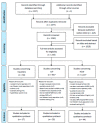Determinants of Vaccination Uptake in Risk Populations: A Comprehensive Literature Review
- PMID: 32867126
- PMCID: PMC7563537
- DOI: 10.3390/vaccines8030480
Determinants of Vaccination Uptake in Risk Populations: A Comprehensive Literature Review
Abstract
Vaccination uptake has decreased globally in recent years, with a subsequent rise of vaccine-preventable diseases. Travellers, immunocompromised patients (ICP), and healthcare workers (HCW) are groups at increased risk for (severe) infectious diseases due to their behaviour, health, or occupation, respectively. While targeted vaccination guidelines are available, vaccination uptake seems low. In this review, we give a comprehensive overview of determinants-based on the integrated change model-predicting vaccination uptake in these groups. In travellers, low perceived risk of infection and low awareness of vaccination recommendations contributed to low uptake. Additionally, ICP were often unaware of the recommended vaccinations. A physician's recommendation is strongly correlated with higher uptake. Furthermore, ICP appeared to be mainly concerned about the risks of vaccination and fear of deterioration of their underlying disease. For HCW, perceived risk of (the severity of) infection for themselves and for their patients together with perceived benefits of vaccination contribute most to their vaccination behaviour. As the determinants that affect uptake are numerous and diverse, we argue that future studies and interventions should be based on multifactorial health behaviour models, especially for travellers and ICP as only a limited number of such studies is available yet.
Keywords: determinants; health behaviour model; healthcare workers; immunocompromised; risk groups; travellers; vaccination uptake; vaccine hesitancy; vaccine refusal.
Conflict of interest statement
The authors declare no conflict of interest.
Figures


References
-
- WHO Ten Threats to Global Health in 2019. [(accessed on 19 May 2020)]; Available online: https://www.who.int/news-room/feature-stories/ten-threats-to-global-heal....
-
- WHO New Measles Surveillance Data for 2019. [(accessed on 6 February 2020)]; Available online: https://www.who.int/immunization/newsroom/measles-data-2019/en/
Publication types
LinkOut - more resources
Full Text Sources
Research Materials

